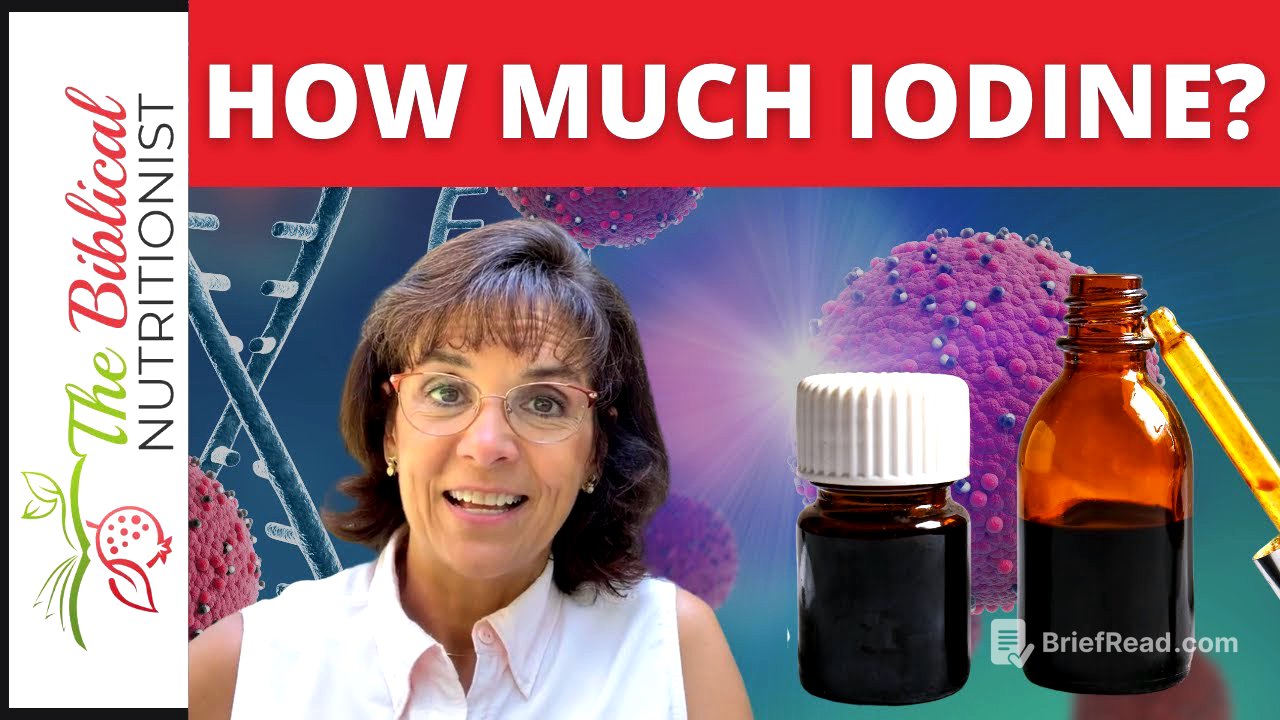TLDR;
This video features an interview with Dr. David Brownstein, who discusses the importance of iodine for overall health. He challenges the common belief that iodized salt is sufficient and explains how iodine deficiency has become a significant health issue, contributing to various cancers and glandular problems. Dr. Brownstein emphasizes the need for adequate iodine intake through diet and supplementation, along with reducing exposure to toxic halides.
- Iodine is essential for every cell in the body and concentrated in glandular tissue.
- Iodine deficiency is linked to increased risks of breast, prostate, thyroid, pancreatic, ovarian, and uterine cancers.
- Toxic halides like fluoride and bromide exacerbate iodine deficiency by displacing iodine in the body.
- Supplementation with iodine, along with unrefined salt, can help correct deficiencies and improve overall health.
Intro [0:00]
Annette Reader introduces Dr. David Brownstein, an expert on iodine, to discuss the benefits and risks of iodine supplementation. She highlights the importance of understanding iodine's role in health, especially for those dealing with cancer, young children, or older adults.
Episode starts [1:12]
Annette Reader interviews Dr. David Brownstein about the importance of iodine. Dr. Brownstein is from West Bloomfield, Michigan, and has written over a dozen best sellers.
Why you need iodine [2:25]
Dr. Brownstein asserts that iodine is essential for the human body, as it cannot be manufactured internally and must be obtained through diet or environmental exposure. Every cell requires iodine, with high concentrations in glandular tissues such as the thyroid, adrenal glands, ovaries, uterus, breasts, prostate, and pancreas. Adequate iodine is crucial for maintaining the normal architecture of these tissues, preventing abnormalities like cysts and nodules.
Iodine deficiency and cancer [3:29]
Dr. Brownstein discusses the iodine deficiency continuum, noting that iodine levels in the U.S. have declined by over 50% in the last 50 years. This deficiency contributes significantly to the rising rates of breast cancer (1 in 7 women), prostate cancer (1 in 3 men), thyroid cancer (the fastest-growing cancer), and increases in pancreatic, ovarian, and uterine cancers. He explains that iodine deficiency leads to cysts, nodules, and hyperplastic tissue, which are precursors to cancer.
Iodine’s functions in our body [6:38]
Dr. Brownstein shares his experience of treating hypothyroidism and discovering the importance of iodine. He realized that many patients needed thyroid hormone because of underlying iodine deficiencies. By using the right form of iodine, he reduced the need for thyroid hormone prescriptions. Adequate iodine levels also improve conditions like fibrocystic breast disease, ovarian cysts, and thyroid nodules.
Cancers in younger people [7:41]
Dr. Brownstein expresses concern over the increasing incidence of cancers in younger individuals, including pancreatic cancer in people in their 40s and breast cancer in teenage girls. He attributes this trend to a worsening iodine deficiency continuum over the past five decades. He stresses the importance of supporting the body with essential nutrients and detoxification to reverse these health trends.
How to get enough iodine [9:40]
Dr. Brownstein advises obtaining nutrients from diet first but acknowledges that iodine levels in the food supply have decreased due to ocean pollution with toxic halides like fluoride and bromide. These halides displace iodine in the body, exacerbating deficiencies. He calls this the double whammy of iodine, where exposure to toxic halides has increased while iodine intake has decreased.
Educate yourself [11:48]
Dr. Brownstein emphasizes the importance of educating oneself about iodine and working with a knowledgeable healthcare practitioner. He advises avoiding fluoridated water and brominated products. Supplementation with 25 to 50 milligrams of iodine and iodide, such as Lugol's solution, may be necessary. He notes that the RDA of 150 micrograms was set to prevent goiter but is insufficient for overall bodily needs, especially in today's toxic environment.
Importance of iodine before pregnancy [14:28]
Dr. Brownstein stresses the importance of adequate iodine intake for women of pregnancy age to support the baby's thyroid and endocrine gland development. Iodine deficiency during pregnancy can lead to abnormal glandular tissue development and lower IQ in the child. He notes that the average iodine level in young women in the U.S. is deficient according to WHO criteria.
Iodine and ADHD [16:51]
Dr. Brownstein discusses the correlation between iodine deficiency in pregnant mothers and the development of ADHD and neurological disorders in their children. He contrasts the current prevalence of ADHD with its rarity in past decades, attributing the rise to nutritional deficiencies, including iodine. He notes that children of mothers who took adequate iodine during pregnancy tend to be more intelligent.
The best iodine supplement [20:08]
Dr. Brownstein mentions that iodine is a very inexpensive supplement. He has been studying iodine for over 20 years. He also highlights the importance of sodium for iodine uptake, recommending unrefined salt with iodine supplementation.
The truth [21:32]
Annette emphasizes the importance of eating foods that God created for us, avoiding lab-created foods, and preventing food addictions. Dr. Brownstein agrees, noting that food companies often add chemicals or deplete nutrients to create cravings. He criticizes the pharmaceutical industry for prioritizing chronic sickness over true healing. He shares his journey from conventional medicine to holistic practices, emphasizing the body's ability to heal with proper support and nutrition.









